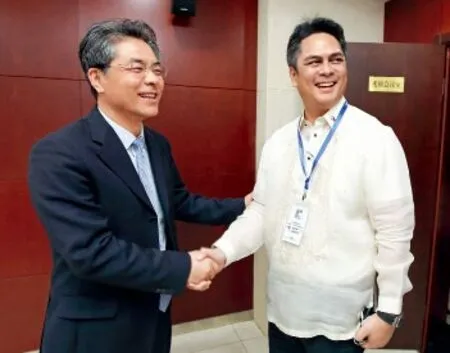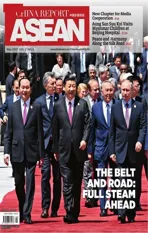New Chapter for Media Cooperation
2017-07-18By
By
New Chapter for Media Cooperation
ByDong Yan
China and the Philippines sign a memorandum of understanding to expand exchanges in journalism and communication

As witnessed by Chinese President Xi Jinping (right, back row) and Philippine President Rodrigo Duterte (left, back row), CIPG President Zhang Fuhai (right, front row) and Philippine PCOO Secretary Jose Ruperto Martin Marfori Andanar (left, front row) sign a Memorandum of Understanding on cooperation in the fi eld of press and publication at the Great Hall of the People in Beijing.
On the afternoon of May 15, as witnessed by Chinese President Xi Jinping and Philippine President Rodrigo Duterte, China International Publishing Group (CIPG) President Zhang Fuhai and Philippines’ Presidential Communications Operations Office (PCOO) Secretary Jose Ruperto Martin Marfori Andanar signed a Memorandum of Understanding (MOU) on cooperation in the fi eld of press and publication at the Great Hall of the People in Beijing.
The signing of the MOU was a signif i cant outcome achieved by both countries during the Belt and Road Forum for International Cooperation. According to the MOU, the two sides will mainly carry out cooperation in three areas, namely personnel exchange, content sharing and cooperative publishing.
The MOU marks a step forward in implementing an important consensus in promoting the Sino-Philippine relationship and enhancing pragmatic cooperation in various fi elds reached by the presidents of the two countries in October 2016. According to a memorandum of cooperation signed in 2016 between China’sState Council Information Office (SCIO) and PCOO, a delegation of PCOO officials and Philippines government media heads paid a visit to China in early May. The event was sponsored by SCIO and organized by China Report Press, a subsidiary of CIPG. During this visit, the PCOO reached an agreement on media cooperation with CIPG, looking to propel pragmatic cooperation and exchange between the two countries in press and publication and improve international communication on both sides.
Opportunities Brought by the Belt and Road
From May 3-12, headed by PCOO Secretary Andanar, the 11-member Philippine media delegation visited Beijing, Nanjing (Jiangsu Province), Suzhou (Jiangsu) and Shanghai, with an aim to gain better insight into the development of China’s press industry and promote pragmatic media cooperation between the two countries.

China International Publishing Group President Zhang Fuhai (left) shakes hands with Philippine Presidential Communications Operations Office Secretary Jose Ruperto Martin Marfori Andanar.
The Philippines holds the rotating chair of ASEAN this year, and the delegation’s visit took place ahead of the Belt and Road Forum, which was also attended by Philippine President Rodrigo Duterte. “The Belt and Road Initiative proposed by China lends a huge opportunity for our country to catch up in our region,” said Secretary Andanar.“It is a testament that growth does not go in a single direction— it is not only from the Western side, but can also spring from the Eastern side of the world. The Philippines embraces the Initiative, and will establish a deeper, more cooperative and more dynamic relationship with the Chinese government.”
During their 10-day tour in China, the delegation visited China Central Television, Xinhua News Agency, CIPG, China Radio International, ASEAN-China Center, Xinhua Daily Media Group, Sanpower Group, Suzhou Daily Group, the Shanghai Electric Power Construction Company, Shanghai Media Group and other major media outlets, where they gained an understanding of these organizations’ integrated media business development and international cooperation as well as Chinese enterprises’participation in the Belt and Road construction.
Secretary Andanar pointed out that through this visit they realized the importance of developing state-run media organizations. “By learning from the experience of our Chinese counterparts, we seek to rebuild the image and inf l uence of our state-run media organizations,”he said.
Pragmatic Partnership
Specializing in international communication, CIPG is one of China’s fi rst institutions to carry out international cooperation in press and publishing. Since it was founded more than half a century ago, CIPG has harvested fruitful achievements in promoting China’s cultural and diplomatic exchanges with foreign countries through book and journal publication.
At present, CIPG annually produces more than 5,000 books and journals in 40-plus languages and runs various websites in more than 30 languages, enjoying a global readership that covers 180 countries and regions around the world. Under its umbrella, the English monthly China Report ASEAN, which was launched in January 2016, focuses on China’s friendly ties with ASEAN countries and aims to build a platform for multilateral exchanges among ASEAN countries and promote understanding and friendship between China and the rest of the world.
PCOO Assistant Secretary Michel Kristian Ablan noted that China’s power in news industry goes far beyond his imagination, and that in terms of media technology China even surpasses Japan and Australia, which he had visited before.“Chinese media organizations attach great importance to international communication, and many include a department specializing in international cooperation, which really impressed me,” he said. “After returning to the Philippines, I will propose the establishment of an international cooperation department within PCOO, so as to enhance media exchange and cooperation with China and other countries.”
Currently, in the Philippines, state-run media platforms are much less inf l uential than their private and Western counterparts. During this China tour, PCOO Secretary Andanar stressed on many occasions that through content sharing, personnel exchange and cooperative publishing, he hopes that media platforms of both countries will provide true and genuine information about the Philippines as a way to counter fake news fabricated by Western media.
